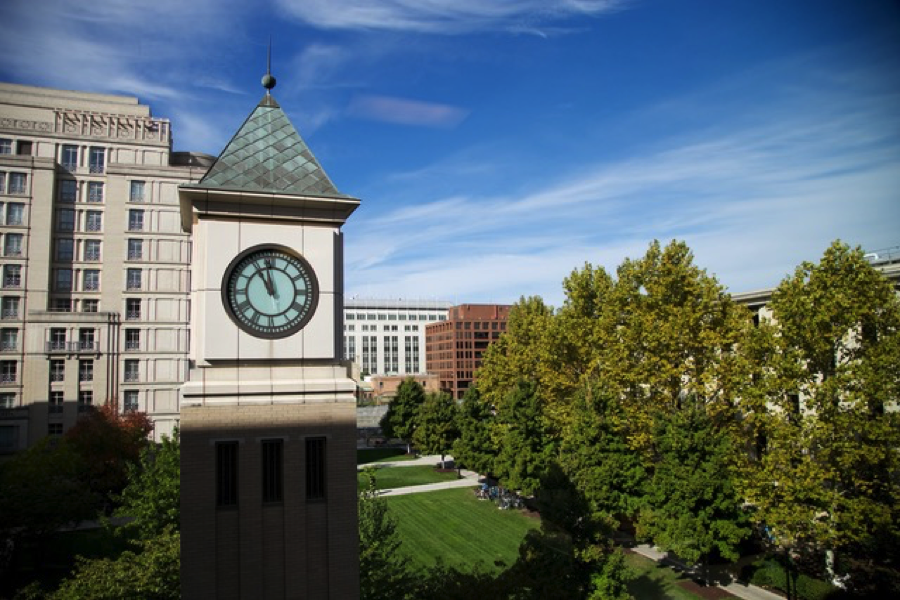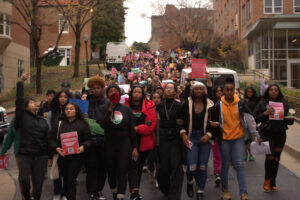Georgetown Law School’s Active Bystandership for Law Enforcement (ABLE) Project, a pro bono initiative to provide peer intervention training to law enforcement, has begun implementing their program with police departments across the country.
The Georgetown Innovative Policing Program (IPP) partnered with international law firm Sheppard Mullin to launch the project after the police killing of George Floyd sparked nationwide calls for police reform and racial justice in July. Much of the nation was shocked to see three police officers do nothing while officer Derek Chauvin pressed his knee onto Floyd’s neck for eight minutes and forty-six seconds. Even though the Minneapolis police department, like most police departments, has the duty to intervene, no intervention took place.
“People don’t intervene even when it’s completely against their self-interest to not intervene,” said Georgetown Law professor Christy Lopez of the situation. Lopez co-leads ABLE with Sheppard Mullin’s Jonathon Aronie. She noted that while there are strong inhibitors preventing such intervention, experts “have learned ways to help people overcome those inhibitors.”
The active bystandership training’s goal is to prepare police officers to intervene when they see misconduct from other cops and create a culture that supports peer intervention. Both the Metropolitan Police Department (MPD) in D.C. and the Georgetown University Police Department (GUPD) are expected to participate in trainings in some way.
MPD’s participation in ABLE comes after allegations of racial profiling following recently released data that showed Black individuals in D.C. were stopped at a much higher rate than non-Black individuals. The city convened a 10-day workshop to discuss how to reduce such racial bias and other racial disparities in MPD policing. Lopez, who also co-chairs the D.C. Police Reform Commission, is simultaneously working to advocate for other changes and policies to tackle racial injustice in that department. (coloredmanga.com)
ABLE also plans to extend its training to the Georgetown University Police Department (GUPD). In December, ABLE will be holding a special session for campus police including GUPD. Lopez has been in discussion with the chief of campus police, Jay Gruber, to involve campus police with other IPP programs such as the Police for Tomorrow Fellowship program which focuses on social inequality and marginalization.
In the past few years, GUPD has faced heavy criticism from students on campus. The Black Survivor Coalition has argued that GUPD over-polices Black students. Others have called out GUPD for the excessive use of force, particularly regarding an incident last year where journalist Kurt Bardella was physically accosted and restrained while trying to enter an event he was staffing.
Lopez sees a role for students and criticisms in the program as well. “I think we could design a whole program that would be really community-oriented and bring in students,” Lopez said. “I’d love to get [GUPD] to fundamentally rethink what their role is and how they interact with people.”
The training ABLE provides is based on the work and research of Dr. Ervin Staub a psychologist and holocaust survivor who studies the psychology of violence. In 2014, Staub turned his focus to American law enforcement and worked with the New Orleans Police Department (NOPD) to create the Ethical Police is Courageous (EPIC) peer intervention training program. This flagship program was implemented in a time where distrust of the police in New Orleans was high, and it showed some promising, if limited, results.
Before coming to Georgetown, Lopez investigated police departments in cities including Ferguson, Chicago, and Los Angeles, and recommended in 2011 that the NOPD pursue peer intervention training even before it became clear what such training would like. About 10 years later, after seeing the positive reaction from both civilians and the police in the NOPD flagship program as well as the dire need for more intervention training following Floyd’s death, Lopez decided to start ABLE.
The project is designed not only to provide active bystandership training but to do so free of charge to any police department who commits to the program. As of now, the project consists mainly of “Train-the-Trainer” events in which ABLE staff trains 25 instructors a session and provides resources to help agencies and departments develop a culture of peer intervention.
In order to ensure that ABLE can effect meaningful and lasting change in police departments, ABLE has 10 standards that must be committed to in order to receive the training. “Although we believe that the training in and of itself can prevent harm,” Lopez said, “what we really want to do is use this training to be a foot in the door to changing policing culture more deeply.”
One of these requirements is two letters from community organizations local to the law enforcement group vouching for their sincerity. According to Lopez, since the training is free, police departments may be more inclined to haphazardly complete the training, which ABLE hopes to prevent. “Some agencies are just looking to be able to check a box and tell their communities they did something,” Lopez said. This standard is designed to make sure law enforcement agencies are really committed to pursuing change. Some departments were unable—or unwilling—to get approval from community groups, according to Lopez.
Additionally, agencies are required to make accompanying changes in policies, mostly focusing on accountability. One policy requirement is the implementation of strong anti-retaliatory policies to protect officers who intervene. Others include misconduct policies that require investigation of any failures to intervene and discipline policies that take into account successful interventions in disciplinary proceedings. Remaining standards facilitate cooperation and data sharing to measure the effectiveness of the training program itself.
Lopez contends that ABLE’s standards are integral to creating the change in the ethos of policing that ABLE hopes to see. “The principles of active bystandership requires you to think about moral courage, not just physical courage,” Lopez said. “Loyalty to your fellow officers is not just backing whatever they do, sometimes it’s stepping in and stopping them from doing whatever they want to do. If that were really the ethos of policing we would have a very different experience with policing in this country.”
She also recognizes that active bystandership training alone cannot end the racial injustice in policing in this country. “It’s one of the most important single interventions I’ve seen, but it has to be a part of a much broader set of interventions and shifts,” Lopez said.
One shift that many have called for in protests against police brutality is reducing the scope of responsibilities that are given to police officers. Though Lopez is not opposed to this, she stressed training would still be needed. “Even if you narrow policing to its proper scope,” she said, “There will still be a need for police and we need those police to be of the highest quality, the highest caliber and have unusually high moral courage.”
ABLE has provided training or is planning to provide training to agencies throughout the country, including several major police departments. These include the New York City Police Department and whole states including New Hampshire, Pennsylvania, Maryland, and Texas, according to Lopez.
“There’s more demand than we can meet,” Lopez noted. “It’s all pro bono and the hold up is that we are trying to do this on our off time.” While ABLE has received some donations, they lack a strong benefactor that can provide them with all the resources they need to undertake such a large project.
Looking forward, Lopez expressed her hope that ABLE can collaborate more with Georgetown students, including student organizations and student-athletes. She believes that activism from these groups has played an important role in calling for meaningful change within the police.
“There’s this false narrative that you are anti-police if you want to change the police,” Lopez said. “It’s just not true and I hope that we can be part of making clear how false that narrative is.”



